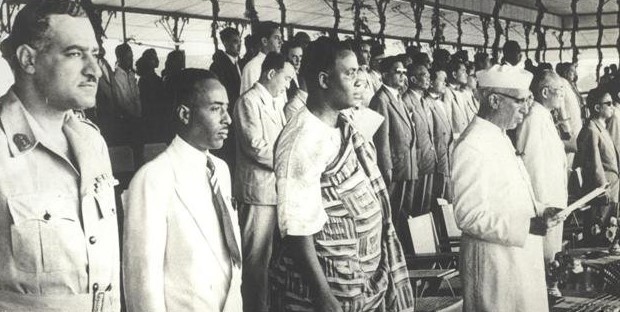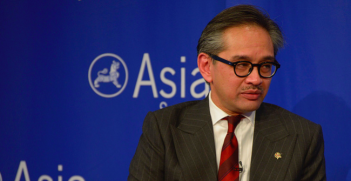The Bandung Moment

The legacy of the 1955 Bandung meeting of Asian and African leaders continues to be debated, including for its ongoing importance for today’s international relations, with particular focus on the host, Indonesia.
From 18-24 April 1955, representatives from 29 Asian and African states and territories met in Bandung, Indonesia, hoping to remake the world. Fired with anti-colonial zeal, the participants at the first Asian-African Conference sought to challenge a global order still infused with racist hierarchy and imperialism. Alongside a common resentment of colonialism, Bandung’s leaders also aimed to win greater foreign policy independence for newly independent states, and to fortify South–South economic and cultural cooperation.
The culmination of a series of anti-colonial conclaves dating back to the early 1900s, Bandung stands on its own as a singular moment in Afro-Asian cooperation. Concluding with a declaration of 10 guiding principles (Dasasila) to promote international peace and cooperation, Bandung was pivotal in bringing the Third World into being as a self-conscious category of actors in world politics, and instrumental in laying the foundations for the Non-Aligned Movement.
What was the Bandung conference’s long-term systemic impact on the evolution of the global international order? What opportunities for Afro-Asian cooperation did Bandung either foreclose or enable? And in what ways does Bandung’s legacy still shape Indonesia’s approaches to domestic and regional order-building?
The four faces of Bandung
Four interpretive frames—stressing, respectively, its order-challenging, order-affirming, order-building and order-transforming aspects—are helpful in making sense of Bandung. Interpretations of Bandung that stress its order-challenging aspect foreground the conference’s common-denominator message of anti-racism and anti-colonialism. With racist hierarchy and imperialism still powerfully present in the international system in 1955, Bandung was notable in providing African and Asian peoples with a unified forum in which to forcefully challenge these structures of inequality.
Bandung generated a nascent movement for non-alignment, which powerfully undermined great power-led security arrangements. It is rightly remembered above all for its assault on racism and empire. That 29 states (at the time almost half the UN’s membership) combined to condemn colonialism served to powerfully discredit European projects of imperial modernisation. In organising and mobilising such a potent anti-imperial constituency, Bandung played a vital order-challenging role in corroding the legitimacy of colonialism.
While the order-challenging elements of the Bandung conference were its most conspicuous, it would be wrong to characterise the event as being predominantly iconoclastic. Western policymakers and academic commentators were at the time seized with the fear that Bandung epitomised an incipient breakdown of international society. These fears rested on the (as it turned out) incorrect assumption that the ordering institutions of international society depended on a bedrock of cultural consensus to function. But Bandung was equally important for dramatising international society’s resilience, as the Asian and African participants largely affirmed many of the existing order’s key organising principles and practices.
Far from constituting a full-spectrum revolt against the West, Bandung critically broadened the global support base for an international order grounded in originally Western models of political organisation (the nation state) and dedicated towards the advancement of a universal human rights regime that drew powerfully (though by no means exclusively) on Western intellectual and cultural traditions. Bandung is important as a critical juncture where Asian and African leaders affirmed key institutions and principles of the existing international order, thereby cementing their global extension.
Both the order-challenging and order-affirming dimensions of Bandung’s position underscore its character as a reaction to an existing Western-dominated international order. But this should not blind us to Bandung’s more creative dimensions, which are illuminated in its order-building and order-transforming aspects. Bandung was as much a proactive Afro-Asian attempt at world making as it was an effort to either negate or affirm different aspects of the existing international order. On the order-building front, the conference explicitly pushed for greater South–South cooperation. In so doing, it prefigured the Group of 77 and later Third World calls for a new international economic order.
Finally, alongside its order-challenging repudiation of colonialism, its order-affirming endorsement of the nation state, and its order-building call for greater South–South cooperation, an undeniably utopian, order-transforming undercurrent also informed Bandung. The Bandung attendees affirmed key elements of the existing international society, but this endorsement sat uneasily with the attendees’ consistent rhetorical appeals to transcend Western-imposed visions of political order with the hope of establishing a more peaceful, inclusive and cosmopolitan order in their place.
Bandung’s legacies
Remembered to this day as the high point of Indonesia’s foreign policy achievement, Bandung continues powerfully to resonate in Indonesia and exert a meaningful influence on its domestic and foreign policies. Whereas Indonesia under Sukarno was at the vanguard of post-colonial revisionism, Australia conversely evinced a strongly loyalist orientation towards the Western-dominated international order of the time. These differences in orientation produced correspondingly divergent approaches to regional order-building, which have endured in the decades beyond Bandung.
Indonesia to this day favours a regional order centred on Southeast Asian institutions, which seeks to insulate local powers as much as possible from the destabilising consequences of great power competition and interference. Conversely, Australia since the 1950s has consistently favoured a regional order grounded as far as possible in the integration of Western great powers in local security architectures.
Bandung’s legacy does not preclude issue-specific forms of security cooperation but Indonesia and Australia nevertheless remain importantly divided by different approaches to regional order-building, even in the face of external pressures that should otherwise be promoting strategic convergence. This is not to suggest that all roads lead to Bandung—that is, that the complexities of the bilateral relationship can be reduced to a critical divergence in the two countries’ foreign policies since 1955. However, it does reinforce that Bandung should be of concern to international relations scholars not merely for its historical interest, but also because of the varied and important ways in which it continues to shape the international order’s contested evolution into the present day.
Andrew Phillips is an associate professor in the School of Political Science and International Studies at the University of Queensland. This is an extract from his article “Beyond Bandung: the 1955 Asian-African Conference and its Legacies for International Order” in a special issue of the Australian Journal of International Affairs.





